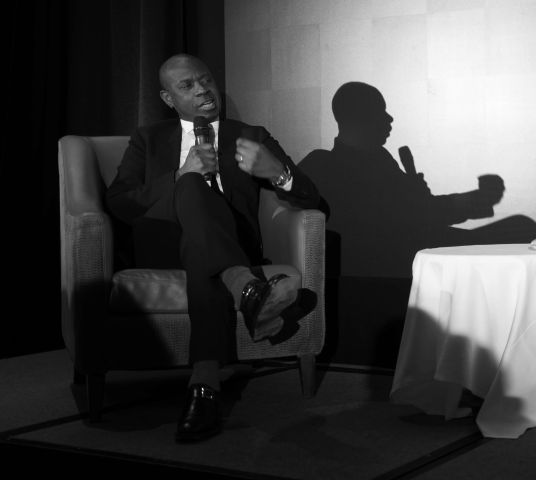BBC news anchor, journalist and Mastermind host Clive Myrie
Clive Myrie has made a career delivering tumultuous news in a voice of calm. He talks to Influence's editor Lysanne Currie about race, vulnerability and hope
Clive Myrie grew up in Bolton. The first inkling of his passion for journalism came on his paper round (he would read front-page stories out loud, newsreader style), but he chose instead to study law. After being offered a Middle Temple place he followed his heart and joined the prestigious BBC journalist trainee scheme. It sparked a 37-year-long career as a news journalist, during which he has reported everywhere from Myanmar to Mexico. Myrie currently fronts the BBC News, Mastermind and travel documentaries. Last year, he released his memoir, Everything is Everything.
Earlier this month, he hosted the BBC’s election television coverage with Laura Kuenssberg – the first time a woman and a Black man had presented the show.
The idea for my memoir, Everything is Everything, came out of a tumultuous few years in which I reported on Covid-19, the George Floyd protests and the war in Ukraine.
There was a sense perhaps my story tied into a lot of those big events that have taken place over the last 10 to 15 years. I’m on the frontline reporting, or I’m at some press conference, and I’m thinking this is affecting me way more than people understand. My two older brothers were caught up in the Windrush scandal and then I report on the Rohingya people kicked out of a land [Myanmar] they’ve called home for decades. I liked the idea of trying to find those stories that somehow crossed over into my private life.

Part of the job of a news journalist is to bring out the human element in order to engage with the guy in the chip shop in Burnley. We are touched by those things that connect us and that’s when change can start to happen.
As BBC presenters we have the same reactions to things as everybody else. I’m happy the Lionesses did brilliantly in Euro 2022. Why shouldn’t I show that on air? How can a nurse kill babies? I need to show my disgust. I do this because I’m a human being like anybody else. If you’re on the right side of history, and on the right side of the debate with the rest of humanity, show it.
Denzel Washington once said, “I’m very proud to be Black, but Black is not all I am”. I wanted to get this across at the beginning of my career. It was a time when I wanted my career to be fun and defined by my ability to cover a range of stories. I didn’t want to [cover] stories because I happened to be Black: it was something I really kicked against. But sometimes a role is thrust upon you. If you’re the only person who’s able to get across that mindset, it’s important [you take this on].
In 2008, I was reporting on Obama’s White House campaign. When he was elected as the first African American president, I was elated. So, I decided to do something I’d never done before as a reporter: I felt compelled to convey my own emotions about what had just happened. It was one of the best things I had ever done as a BBC journalist.
Many people were hurt by the 2008 financial crash – but not a single banker went to jail. Working-class people ended up paying for that, by living with austerity and having services cut. They were angry. This was the first time something like this had hit white America. So they went for this bloke [Trump] who’s promising everything. [They thought] ‘Trump might be a jerk but and I’ve seen him on The Apprentice, and he seemed to do okay with those businesses.’ And it’s not just here or in America – it’s in France and Germany with the rise of far-right parties. There’s a sense that capitalism, and the way western democracies have operated over the last 60 years, hasn’t benefited enough people.
Headlines may hit you with corruption but the vast majority of companies are trying their best. They are good, well-run and are critical to the lifeblood of our society.
If you’re not thinking in a holistic way about businesses, and the fact that they’re built on the shoulders of everybody, you’re going to get disparity and wealth being distributed to just one section of society. You might have come up with the brilliant idea [as a businessperson] and been a big success but the education of your workers is paid for by everybody else; you’re only able to take your stuff to market on roads paved by someone, and you’re only able to operate freely and fairly and securely because of a police force paid by everybody else.
Gen Z aren’t worrying about pension plans. What matters to them is a company that falls in line with values: diversity, inclusion, equity. If they don’t see that they will call it out. I am optimistic for the future.
Everything Is Everything: A Memoir of Love, Hate & Hope by Clive Myrie is published by Hodder & Stoughton.
Clive Myrie is the headline speaker at the CIPR Annual Conference next month.

